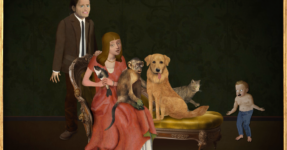
When Your Child Is an Animal
As I watched “Chimp Crazy,” I read New York magazine’s issue on pet ownership. The cover features a person dressed in full feline costume, holding the bars of a window as if peering out from inside a jail cell, and its pages are dense with slang — “pet parent,” “fur baby,” “starter child” — that suggest that when we are talking about our pets, we are really talking about ourselves. Or at least, our children.
The essay that blew up online, “Why Did I Stop Loving My Cat When I Had a Baby?,” is an anonymous new mother’s story of how her beloved cat, Lucky, became her postpartum nemesis. As Lucky is recast as a nuisance, she bears the brunt of the author’s frustration and desperation at the overwhelming burden of caring for her first child. In the essay, the mother couches this as a problem of diminished affection. Her online critics scolded her, in a repeated refrain, that “love is not finite.”
Tonia Haddix loves her chimps; the anonymous magazine writer loathes her cat. In each case, animals suffer, and love only confuses the issue. Infinite love is a pretty idea, but caretaking is labor, and the human capacity to work has limits.
Lucky’s owner, who worries that her treatment of her cat makes her a “psychopath,” neglects the cat as she waits for her love to magically return. As I read her story, I wondered if the very expectation that her heart produce the boundless love necessary to fuel superhuman acts of care prevents her from doing right by her pet, and finding Lucky a caregiver who can meet her needs, no sentimental gloss required.
Confining care to the traditional family — which too often means unloading all the caretaking on one woman — does not do justice to either children or their parents, much less the pets. When JD Vance told Tucker Carlson a few years ago that America is run by “childless cat ladies,” he waged a culture war against any woman who resists this punishing isolated model of care. As Vance later clarified, “I have nothing against cats”: The cat, with its reputation for aloof independence, merely signifies the woman who is free to pursue a public life outside the home.
Vance is not the only one suggesting that women retreat to the home to raise their children with singular obsession. Every few months on X, I’m served evidence of a cultural crosscurrent suggesting that children, and by extension their parents, are unwelcome or unfit for public life. Seared in my memory is an internet fight that broke out last November when a self-described “PetParent” posted about a toddler who ran up to her dog. After blocking the girl with her body, the woman reported that she schooled the girl (“Maybe we don’t run up to dogs we don’t know”) and then schooled her mother: “If she isn’t on voice recall,” the woman said, referring to the mother’s child, “maybe she should be leashed.”



